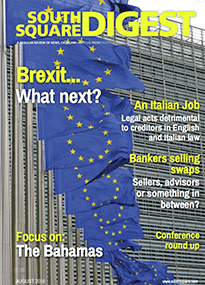

In the light of the decision in Re Powa (UK) Limited, Adam Al-Attar suggests that the rule in Cherry Tree Investments requires a re-think.
Introduction
In Cherry Tree Investments Ltd v Landmain Ltd [2013] Ch 305, the majority of the Court of Appeal held that, in construing a registered charge, the court should give little weight to relevant, admissible but extrinsic evidence. In particular, it held that the court should give little weight to the terms of the facility agreement between the contracting parties under which the debt secured was owed. In that case, the registered charge did not refer to the facility agreement in any way. Lewison LJ (with whom Longmore LJ agreed) held that the protection of the reasonable expectations of third parties who had enquired or might enquire of the register required that little weight be given to the facility agreement which, although admissible, would undermine those expectations. The expectation in question was that the power of sale under the charge was the power implied in law (as if a term of the deed) by section 101 of the Law of Property Act 1925 and not the extended power of sale, which the parties had agreed to, in the facility agreement. The principal purpose of this article is, first, to suggest that the rule in Cherry Tree is overly exclusive of relevant evidence and requires a rethink and, secondly, to suggest an alternative in which extrinsic evidence is not excluded when the question of construction is one the answer to which a third party can have no reasonable expectation of reliance. The ancillary purpose of this article is to explore how the rule in Cherry Tree should operate in a case in which the registered document refers to other documents which are not registered. Is there a defensible midpoint between the four-corners of a registered document and the ordinary rules of construction by which all parts of the matrix of fact might be considered? If so, what is it? The article has been prompted by the decision in Re Powa (UK) Limited (in administration); an unreported decision of Murray Rosen QC (sitting as a Deputy Judge of the High Court) which was for a time embargoed for reasons of commercially sensitivity. Powa concerned a USD60m convertible note issue by the company’s listed parent direct to noteholders (i.e. without a note trustee) secured by fixed and floating charges given by the parent and by the company as guarantor. The dispute as to construction arose because the charge given by the company was registered, but did not define the secured liabilities. It instead, via a series of crossreferences outwith the registered four-corners of the charge, referred to the definition supplied by the deed constituting the notes. That deed had, by apparent error, omitted to mention the company’s guarantee as a designated finance document. The case, accordingly, considered, but without ultimately deciding the point, the question of whether (and if so how) the rule in Cherry Tree should operate in a case in which the registered document refers to other documents which are not registered.
Admissibility and weight
The phrasing of the rule in Cherry Tree is odd. It is expressed by the majority of the Court of Appeal as a rule about the weight of extrinsic evidence, rather than as to its admissibility (see, in particular, [123] [127]-[128]). It is however difficult to see a relevant difference between a finding of inadmissibility and a finding of zero-weight, or, indeed, why one should think in terms of evidential weight in the context of a question of construction. The above criticism is not nitpicking about labelling. The exclusion of evidence occurs for a myriad of policy reasons. It can, for instance, in exceptional cases extend to evidence illegally obtained, although instances in which the court will close its eyes to the truth because of some other wrong done are rare. Legal-policy reasons for excluding evidence are commonly encountered, even in civil cases. The parol evidence rule which excludes oral evidence from a dispute as to the meaning of a written contract is one such rule. So too is the exclusion of pre-contractual negotiations, even if written. Each such exclusionary rule is reflective of and supports the achievement of an objective construction. Neither, however, can be said to flow directly from the objective principle and is instead explained in terms of achieving a distinct legal policy aim. For a fuller discussion of this point, see the speech of Lord Hoffmann in Chartbrook Ltd v Persimmon Homes Ltd [2009] 1 AC 1101. The rule in Cherry Tree is an exclusionary rule of this kind. That much is clear from its operation – to exclude evidence in all but name – and its rationale, specifically, the justification for excluding extrinsic evidence from consideration in construing a register ed document is to protect the reasonable expectations of third parties who have or might rely on the registered document. It has nothing to do with an objective meaning as between the parties, which is the essence of the objective principle as traditionally explained. In this respect, Lewison LJ however approved of the following passage in the judgment of Campbell JA in Phoenix Commercial Enterprises Pty Ltd v City of Canada Bay Council [2010] NSWCA 64: “However, the way those principles come to be applied to a particular contract can be affected by aspects of the contract such as whether it is assignable, whether it will endure for a longer time rather than a shorter time, and whether the provision that is in question is one to which indefeasibility attaches by virtue of the contract being embodied in an instrument that is registered on a Torrens title register. All these are matters that would be taken into account by the reasonable person seeking to understand what the words of the document conveyed. That is because the reasonable person seeking to understand what the words convey would understand that the meaning of the words of the document does not change with time or with the identity of the person who happens to be seeking to understand the document. That reasonable person would therefore understand that the sort of background knowledge that is able to be used as an aid to construction, has to be background knowledge that is accessible to all the people who it is reasonably foreseeable might, in the future, need to construe the document.” By this passage, Campbell JA treated the exclusionary rule as part of the objective principle. He elides the distinction between a reasonable interpretation as between the parties and a reasonable third party who – looking in on the parties’ dealings as if through a window – reviews a document to which he knows he is not a party and necessarily without full information. It is essential to emphasise the correct rationale of the rule is the protection of third party expectations because the rule in Cherry Tree is a judge-made one. Unlike a legislative rule, the interpretation of which may involve a tension between the legislature’s words and the legislative purpose, a judge-made rule, or rather a given formational by a judge, is vulnerable where it over-steps its rationale. This is because a judgemade rule has no definite expression in language. What matters is the concept behind it. So analysed, it is a mistake to conceive of the rule in Cherry Tree as part of the objective principle of contract law. It is a rule to protect third parties. It operates to restrict the corpus of material ordinarily available to find an objective meaning applicable to the parties. It should not, therefore, apply to exclude extrinsic evidence where there can be no reasonable third party expectation worthy of protection. This observation has particular significance to cases in which the question of a registered charge is what debt is secured.
Secured debt and registration
A debt is an obligation to pay a sum of money that can be enforced (as distinct from a breach sounding only in damages). It is why an action in debt has sometimes been referred to as common law specific performance. A secured debt is debt for which security is given. This may be personal security in the form of a guarantee, or a proprietary security such as a charge which entitles the secured creditor to exercise rights in relation to the secured assets by way of enforcement. The rights of enforcement are various: to sell, to appoint a receiver to collect income, to appropriate, and so on. Such security rights are significant to third parties. This is because the secured asset is frequently itself a property right and the charge or mortgage which creates the security is always a property right. The distinguishing feature of a property right is that it binds third parties without their consent. For this reason, the perfection of many proprietary security rights is now dependent upon registration in a public register. Registration gives notice to the world of the right and so, at least, allows the right-holder to say against the third party that he at least had notice because he could (and should) have checked the register1 . Other systems of registration, such as the Torrens system of land registration in Australia (and latterly our own move towards a complete registration of land) utilise registration to facilitate transactions. A purchaser of registered land enjoys a registration defence which is subject to very limited exceptions such as overriding interests. Indeed, this is the primary purpose of land registration to which the register of charges on the title is ancillary, although it too fulfils an important purpose in its own right. Hence, it has been said that the system of land registration is now one of “title by registration”, implying that it is registration that is constitutive of the right, whether freehold or leasehold or other title. This aim is further reflected in the narrow and statutorily defined grounds upon which the register of title can be rectified under the Land Registration Act 2002. Neither the aim of giving notice of a property right to an unwary third party nor of creating a system of title by registration is however undermined by the admission of extrinsic evidence in order to ascertain what debt is secured by a charge. A third party can never have any reasonable expectation as to what the debt is. This is best illustrated by two examples: a registered charge which itself states the debt secured; and a registered charge which does not itself state the debt owed but instead secures an unregistered facility agreement. As against all-the-world, the facility agreement is a private document between banker and customer. For present purposes, it does not matter whether the registered charge references the facility agreement. In the first example, all that can be gleaned from the register is that a given debt was owed on registration. Even this assumes an advance occurred. Since that date, the principal amount may have been paid in full. Equally, it might be outstanding in whole or in part with interest accruing on, on this assumption, an unknowable principal amount. In the second example, the position is essentially the same, but one does not even know the initial parameters as to principal or interest. There may be fees and other contingencies the effect of which may have been to extend the debt far beyond the amount of the original facility limit. There may, moreover, have been amendments and revisions including of the facility limit 2. Given the above, on what basis can a third party examining a registered charge which secures a debt defined in an un-registered agreement assert a reasonable expectation about the debt secured? Even in a case in which the registered document states an amount for the debt, the debt owed at any given time may be more or less than that amount. If, as would appear to be the case, the third party must accept that he can have no expectation as to the amount of the debt, he must look to another document, indeed, the current state of account between the parties, to know the amount of the debt. It follows that the third party can have no reasonable expectation as to the scope of the debt in terms of the debt obligations secured. The enquiries which a third party must make undermine any basis for a reasonable expectation as to the scope of the debt. It is no answer to say that the parties might, at least, register the abstract scope of the debt obligation. It is the state of the account that matters in commerce. Further, the mere existence of a debt, even of £1 and even if contingent, renders the security effective, bringing into play the full restrictive force of the proprietary security 3 and any associated restrictive covenants. Neither the amount owed nor the abstract scope of the debt obligation has a bearing on these matters. So assessed, the rule in Cherry Tree should not apply where the question of a registered charge is what is the debt secured. In this respect, it is to be recalled that Cherry Tree concerned an attempt to rely on a power of sale in a facility agreement to override the power implied by law into the registered charge (as if part of the deed) by section 101 of the Law of Property Act 1925. The power of sale is an aspect of the proprietary security, which is capable of affecting third parties, as described above. It is clear that the policy of the law should exclude extrinsic evidence which would undermine the expectations of those who have or might rely on the registered charge to ascertain what it permits in terms of enforcement action. It is not however clear why that policy should apply where the question is as to the debt secured. This should be a question as between debtor and creditor for which there is access to the full matrix of fact. The above approach, therefore, differs from the approach favoured by the dissenting judgment of Arden LJ, who, in her conclusion on this point at [54], favoured a rule which would admit extrinsic evidence depending upon whether there are third parties who would be prejudicially affected by its admission. The difficultly with this approach is that the meaning of the contract would change depending upon a subsequent event and, moreover, one which is uncertain. In particular, Arden LJ acknowledged, at [57], that her preferred approach might require the court to mitigate any potential prejudice by making a declaration as to the meaning of a registered document conditional upon the consent of potentially prejudiced persons. It is however difficult to see why an adjudication of rights as between parties should depend upon the consent of non-parties. The notion that a declaration of contractual rights should be granted or withheld by reason of the grant or refusal by a non-party of its consent appears to have no basis in law.
Incorporation by reference
Had the preferred approach above been available in Powa, the decision should have been simpler. The Deputy Judge would have had unrestricted access to the subscription agreement which preceded the note issue and to the deed constituting the notes, each of which provided clear(er) indications that the secured liabilities included the company’s guarantee of the notes issued by the parent (the noteholder’s case) as opposed to merely the contingent obligations for damages for breach of negative covenants and warranties (the unsecured creditor’s case put by the administrators). The parties however approached the matter on the footing that the judge was bound by Cherry Tree and not in a position to re-interpret it. The court was, therefore, required to consider the dispute on two alternative footings, first, that Cherry Tree was a special decision concern with “self-contained” registered documents and, secondly, that Cherry Tree applied and required the court to look only to the registered charge and its incomplete definition of secured liabilities. The judge decided the case in favour of the respondent noteholders on the second basis. He accepted that, in contrast to Cherry Tree in which the creditor had sought to use the facility agreement to introduce a power into the registered charge in place of those implied by statute, the dispute in Powa arose only when the incomplete definition of secured liabilities in the registered charge was read with the definition of finance documents in the deed. Without putting the two together, which a third party reading only the registered charge could never do, the ambiguity that gave rise to the unsecured creditor’s argument did not arise. For this reason, what the judge had to say as to the scope of Cherry Tree is dicta, but it is that part of his judgment which is of wider interest. He did not accept that Asplin J in ICM Computer Group Limited v Stribley & Ors [2013] EWHC 2995 (Ch) had confined Cherry Tree to “selfcontained” registered documents, by which she appears to have meant those which made no express reference to other documents by their terms. He did however accept that Cherry Tree was concerned with such a document. This point, therefore, remains open. Of potentially greater significance to future cases, he considered the extent to which reference could be made to a document referred to by a registered document in construing the registered document. As noted above, the unsecured creditors had to reach outside the registered charge to identify the ambiguity which gave rise to the construction in their favour. They did this by reliance upon the doctrine of incorporation by reference, treating it as a special rule which entitled (indeed, required) only the relevant definition in the deed referred to by the charge to be read into the charge. In concrete terms, only the definition of finance documents was to be incorporated into the charge, and not any other terms of the deed. The judge rejected this submission, saying that, had he to decide the point, he would have concluded that the cross-reference in the charge to the definitions of the deed allowed him to look to all terms of the deed and thereby to resolve any ambiguity otherwise created by importing only the seemingly erroneous definition of finance documents alone. The conclusion that reference can be made to the four-corners of a document referred to by a registered document but not any other document referred to in that document is difficult to sustain. It occupies an unstable middle ground in which there is no logical place to stop once the four-corners of the registered document are exceeded The difficultly is neatly illustrated by the facts of Powa. The registered charge referred to the unregistered deed for its definition of finance documents. Listed amongst the finance documents were the deed itself and the subscription agreement. It is difficult to see any difference in principle between a cross-reference to a definition and the defining document itself (both permitted, on the judge’s view) and other terms and documents referred to in that definition or document (not permitted, on the judge’s view). To admit the former on the basis that it is consistent with Cherry Tree, but not the latter is to draw a distinction without a relevant difference. The reasonable expectations of a third party as to what the registered document may mean are defeated by the first cross-reference. The known unknown of other terms essential to the comprehension of the registered document denies any ground for a legitimate expectation based solely upon the registered charge. Assessed in this light, there would appear to be a good argument that Cherry Tree should be understood as Asplin J suggested in ICM Computers, specifically an exclusionary rule confined to “self-contained” registered documents. A consequence of this argument, if accepted, is that the court has to say what a “self-contained” document is. This may well be more difficult than first impression would suggest. The clearest definition is a document which does not refer to any other expressly. But what of documents referred to as part of a group rather than by name? What of implied reference, as where a document clearly contemplates or presupposes other documents?
Priority?
The potential difficulties in these respects suggest that the error in Cherry Tree was to conceive of the matter as a search for an appropriate exclusionary rule. An alternative rule would be to cede priority to the meaning of the registered documents in the event of conflict with the unregistered document. This would have allowed the power of sale under section 101 of the Law of Property Act 1925 to prevail over the parties’ contract. In other words, a priority rule would have reached exactly the same result as an exclusionary one. This is not however the sort of rule a judge can readily make, if at all. It involves a departure from the parties’ agreed legal rights. There is no indication in the Law of Property Act 1925, the Land Registration Act 2002 or the Companies Act 2006 that a registered document is to have a distinct legal meaning and, if in conflict with other contractual documents, is to have priority as to that meaning. The protection of third parties who have or might rely upon the meaning of a registered document is, as such, dependent upon some form of exclusionary rule. As matter stand however, the rule in Cherry Tree is uncertain in scope and potentially unjust when applied to questions which can have no impact on the reasonable expectations of third parties.
Adam Al-Attar acted for the noteholders in Powa
1. For this reason a definite public register is essential and is not to be confused with notoriety of a fact or practice. The court may accept as a fact a matter of which it is deemed to have judicial notice and similarly it may accept that participants in a market have knowledge of facts or practices notorious in that market. Notice of a matter by participants in a market of fact is very different from constructive notice to the world-at-large by virtue of a public register. Such a register is created for that purpose, officiated (by the state) to that end and can usually only be altered by special procedure upon narrow grounds.
2/. Indeed, in modern commerce that it would be realistic to
assume the possibility of an amendment and extension because it is favoured over a cancellation and fresh loan because it does not trigger the need for a security review or re-engage hardening and look-back periods under the Insolvency Act 1986.
3/. This refers to essential aspects of fixed and floating charges: respectively, the restriction on the debtor’s power of disposal without consent of the creditors, and the restriction on the debtor’s power of disposal save in the ordinary course of business.







![Brake & Anor v The Chedington Court Estate Ltd [2023] UKSC 29](https://southsquare.com/wp-content/uploads/2024/02/Brake-Anor-scaled-e1728649908896.jpeg)








![New Judgment: Re Argentex LLP [2025] EWHC 3125 (Ch)](https://southsquare.com/wp-content/uploads/2025/06/alejandro-pohlenz-gYbOFTwcJx4-unsplash-scaled.jpg)
